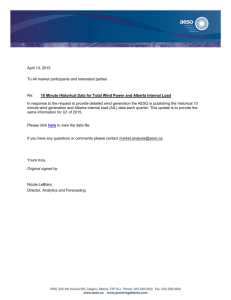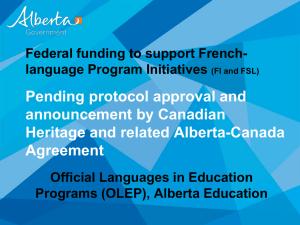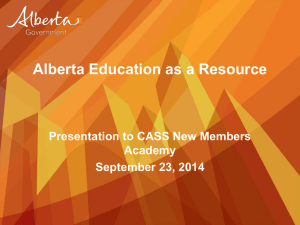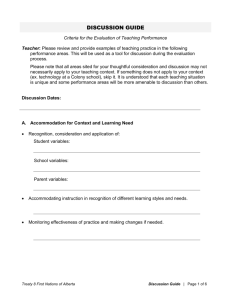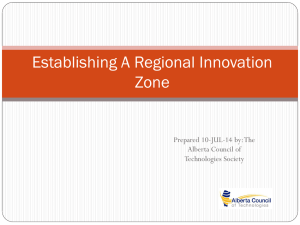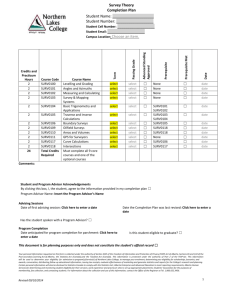Enhancing Second Language Learning
advertisement
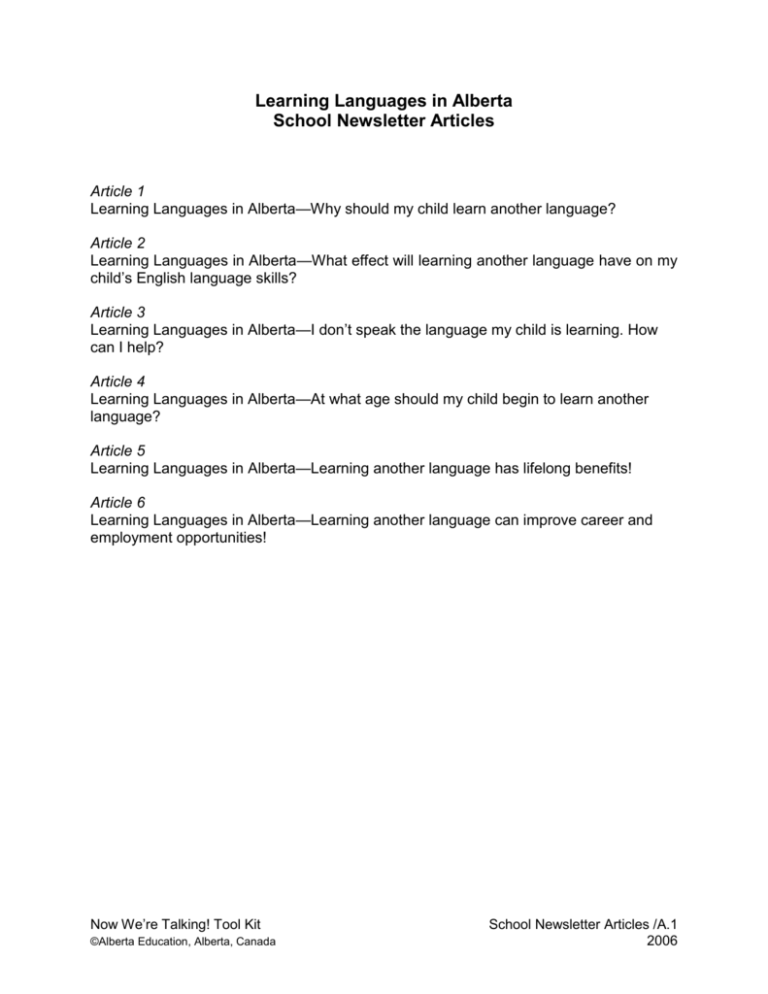
Learning Languages in Alberta School Newsletter Articles Article 1 Learning Languages in Alberta—Why should my child learn another language? Article 2 Learning Languages in Alberta—What effect will learning another language have on my child’s English language skills? Article 3 Learning Languages in Alberta—I don’t speak the language my child is learning. How can I help? Article 4 Learning Languages in Alberta—At what age should my child begin to learn another language? Article 5 Learning Languages in Alberta—Learning another language has lifelong benefits! Article 6 Learning Languages in Alberta—Learning another language can improve career and employment opportunities! Now We’re Talking! Tool Kit ©Alberta Education, Alberta, Canada School Newsletter Articles /A.1 2006 Article 1 Learning Languages in Alberta—Why should my child learn another language? Preparing our children for a changing world is one of the main objectives of education in Alberta and a primary concern for parents. Learning another language can help your child to: improve listening skills increase cognitive abilities, creating a more flexible thinker enhance communication skills in his or her first language develop a deeper understanding of his or her own culture improve overall school performance make learning a third or fourth language much easier. We are now more closely connected to our global neighbours than ever before. Advances in technology are making it easier to travel and communicate with people all over the world. Increasing immigration is making our local communities more diverse and enriched. In addition, our economic well-being is linked to our ability to succeed in the international marketplace. Knowing another language can give your child: a lifelong ability to communicate with more people an increased understanding of and respect for people of other cultures broader educational and career opportunities a competitive edge in the job market more opportunities to enjoy literature, art, music, theatre, sports and travel. Knowing another language can prepare your child to be a part of the new global community. And language learning is fun! A.2/ School Newsletter Articles 2006 Now We’re Talking! Tool Kit ©Alberta Education, Alberta, Canada Article 2 Learning Languages in Alberta—What effect will learning another language have on my child’s English language skills? Many parents worry that their children’s English language skills will be affected by learning another language. The truth is that a child’s English will not be harmed by learning another language and may even be improved! In studies that looked at the effect of learning another language on first language skills, the results have been positive. Students in second language programs readily transfer the skills they learn in one language to the other. They learn a lot about the English language by looking for similarities and differences between English and the language they are learning. All Alberta students take the same English language arts program and are expected to achieve the same standards. In early immersion programs, because of the initial focus on learning the second language, students do lag behind peers in the regular program in some English skills. However, they quickly catch up once they have had one or two years of English language arts. By Grade 5 or Grade 6, children in immersion programs do as well as or better than those in the English language program. Many studies have found that English skills are actually enhanced by learning another language. Immersion and bilingual program students often outperform students in the regular program in some English skill areas. Want to help improve your child’s English language skills? Suggest learning another language! Now We’re Talking! Tool Kit ©Alberta Education, Alberta, Canada School Newsletter Articles /A.3 2006 Article 3 Learning Languages in Alberta—I don’t speak the language my child is learning. How can I help? Motivation and a positive attitude toward learning are key factors in any child’s success. Simply taking an interest in your child’s progress and encouraging activities that enhance language learning will put you—and your child—on the right track! Discuss the language program or course with your child’s teacher and find out what you and your child should expect from the experience. Encourage your child to talk to you regularly about what he or she is learning and to teach you some words and phrases in the new language. Practise together! Add target language resources, such as an age-appropriate bilingual dictionary, verb book and atlas, to the family bookshelf and encourage your child to use them. The teacher will be able to suggest titles and sources. Encourage your child to use and experiment with English. Children readily transfer skills learned in one language to the other. By encouraging reading, writing, word games, and family discussions and debates, you will be helping to enhance your child’s communication skills in both languages. Children enrolled in language programs make the most progress when they hear the target language outside of school. You can encourage your child’s interest in other languages and cultures if you: go on family outings to cultural events that feature music, dance and food from countries where other languages are spoken find posters, books, magazines, videos, television programs, board games, computer games and Internet sites in the language that interests your child offer your child the chance to participate in an exchange program or in educational tours that provide opportunities to interact with native speakers of the language and to experience the culture encourage your child to interact with a relative or friend who speaks the language, through visits, letters, telephone conversations or e-mail. Stay positive, encourage growth and celebrate success! Your child will do the rest. A.4/ School Newsletter Articles 2006 Now We’re Talking! Tool Kit ©Alberta Education, Alberta, Canada Article 4 Learning Languages in Alberta—At what age should my child begin to learn another language? There is no magic age to begin learning another language! Languages can be learned at any age or stage of life. Interest and motivation are the key factors. Most language learning experts agree that it is easier to learn another language at a young age (before adolescence). The earlier children are exposed to another language, the greater their chances of learning to use the language like a native speaker. This is because: language learning appeals to the younger child’s love of repetition and mimicry younger children’s communication needs are less complex than those of older children or adults unlike older children and adults, younger children are risk takers and not afraid of making mistakes a younger child’s vocal structures are more flexible than those of older children or adults—this makes it easier to develop an authentic accent. As a general rule, the more time your child spends learning another language the more proficient he or she will become. For a young child, choose a language program or course sequence that begins in the elementary grades and continues throughout the secondary years. Encourage your child to stick with it. When helping an older child choose a second language program or course sequence, discuss the options available. Talk about how the benefits fit with his or her future goals. Encourage a long-term commitment. Remember, learning any language is a lifelong pursuit! Just as your child’s first language skills will improve over time, so too will your child’s second language skills. A long-term commitment will give your child the best results! Now We’re Talking! Tool Kit ©Alberta Education, Alberta, Canada School Newsletter Articles /A.5 2006 Article 5 Learning Languages in Alberta—Learning another language has lifelong benefits! The benefits of learning another language are many and can touch all parts of your child’s life. When you learn another language you exercise your brain. You not only learn how to communicate in another language, you benefit from a whole new set of skills and abilities! Depending on when your child starts to learn another language, and the length and intensity of this experience, your child can: become a better listener develop greater self-discipline learn to compare and contrast, solve problems and think more creatively. Gaining these skills can lead to improved learning (and higher marks!) in other subjects, such as mathematics, science and social studies. Learning another language in school can also open up the educational opportunities your child will have after senior high school. If your child knows another language, he or she: will have more universities, colleges and technical training institutions and programs to choose from—both in Canada and in other countries will be able to enroll in degree programs and courses that have a second language prerequisite will have access to a larger pool of information from which to study and learn. Many Canadian post-secondary institutions offer options to study abroad, as well as work experience opportunities that require skills in another language or for which these skills would be an advantage. Students who know or are learning another language may participate in a variety of exchange programs, summer courses and opportunities to work abroad. Learning another language will help prepare your child for the challenges and opportunities in our changing world! A.6/ School Newsletter Articles 2006 Now We’re Talking! Tool Kit ©Alberta Education, Alberta, Canada Article 6 Learning Languages in Alberta—Learning another language can improve career and employment opportunities! Communication skills, mobility and flexibility are key factors for getting jobs and advancing in the rapidly changing and increasingly interdependent world of the 21st century. Skills in at least two languages can provide an edge in this global job market. Young people who know more than one language have a wide variety of career and employment opportunities open to them. These opportunities may require the immediate use of a second language, or a second language may be needed to advance to higher level jobs. Here are just some of the opportunities: The service sector offers opportunities in travel and tourism, sales, customer service (including call centres) and clerical positions. There is a growing demand for employees who speak languages in addition to English, in areas such as the import/export sector, marketing, computer software development and technical support, public relations, investment, management and transportation. Communication and media opportunities include international advertising, radio and television, writing (including technical, commercial and sports writing), translation, publishing and filmmaking. Libraries, museums, foundations and governments require researchers and employees with abilities in more than one language. The education field in Alberta, across Canada and abroad increasingly requires teachers and researchers with skills in more than one language. Many organizations require translators, interpreters and researchers. Not only are employers looking for language skills, many also recognize that people who know more than one language often have other desirable skills, such as problem-solving skills, self-discipline and the ability to understand cultural differences. Many employers want staff members who are adaptable and can travel in or move to other countries. They take advantage of the fact that it doesn’t cost more to hire someone with fluency in more than one language, but it gives them more for their money! In Alberta alone, more than 2,000 businesses export goods and services around the world. In the year 2000, our exports represented over one third of our economic activity, or more than $59 billion. The business Albertans do with foreign markets involves some 500,000 jobs. With skills in another language, your child will be prepared to take on the new world of work! Now We’re Talking! Tool Kit ©Alberta Education, Alberta, Canada School Newsletter Articles /A.7 2006
